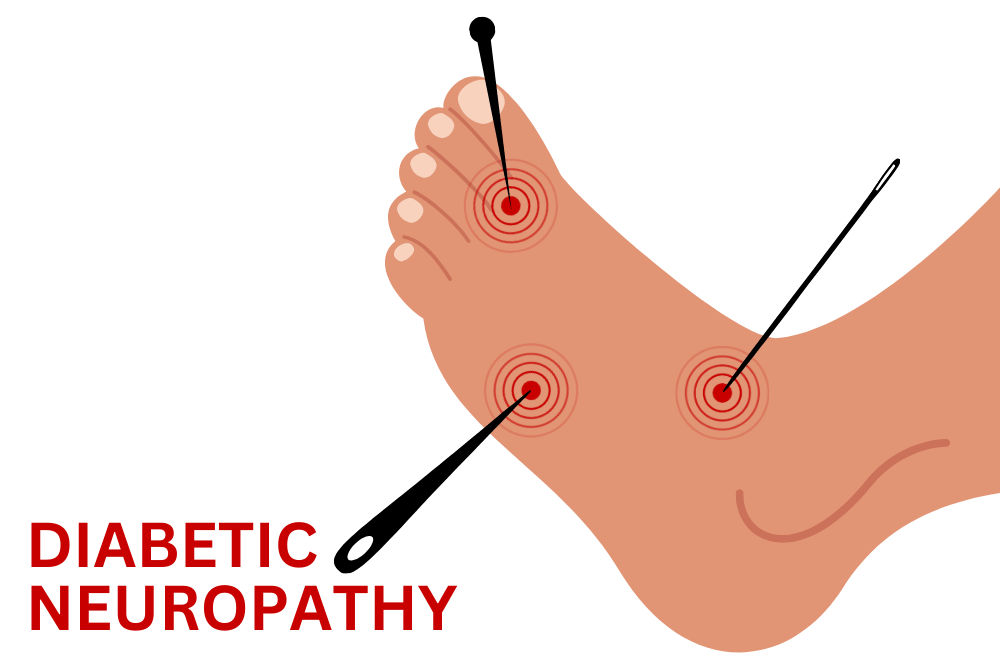Introduction
Diabetic neuropathy is a serious complication that affects a significant number of individuals living with diabetes. It is a type of nerve damage caused by high blood sugar levels over an extended period. This condition can have a profound impact on a person’s quality of life, as it leads to a range of symptoms that affect various parts of the body. Understanding the timeline of diabetic neuropathy development is crucial for both diabetes patients and healthcare providers. In this article, we will delve into the factors influencing the onset of diabetic neuropathy, its stages, and important information for early detection and management.
The Relationship Between Diabetes and Neuropathy
Diabetes is a metabolic disorder characterized by elevated blood sugar levels resulting from the body’s inability to properly use insulin or produce enough of it. Prolonged periods of high blood sugar can lead to damage in various parts of the body, including the nerves. Diabetic neuropathy occurs due to the direct impact of high blood sugar on nerve fibers throughout the body. While the exact mechanisms are complex and not yet fully understood, research suggests that high blood sugar levels can lead to inflammation, reduced blood flow, and oxidative stress, all of which contribute to nerve damage. Please fill out this form to determine whether or not you or a friend are eligible for a CGM.
Factors Influencing the Development of Diabetic Neuropathy
The timeline for the development of diabetic neuropathy can vary widely among individuals. Several factors play a role in determining how quickly the condition progresses:
- Duration of Diabetes: One of the most significant factors is the duration of diabetes. The longer an individual has been living with diabetes, the higher the risk of developing neuropathy. It’s important to note that diabetic neuropathy is not an immediate consequence of diabetes diagnosis; rather, it tends to develop gradually over several years.
- Blood Sugar Control: Maintaining stable blood sugar levels is crucial in preventing the onset and progression of diabetic neuropathy. Poorly controlled diabetes with frequent spikes in blood sugar levels puts individuals at a higher risk of developing nerve damage. Consistently high blood sugar levels contribute to the gradual deterioration of nerve fibers.
- Type of Diabetes: Both type 1 and type 2 diabetes can lead to neuropathy, but the risk might be higher in type 2 diabetes due to the often longer duration of uncontrolled blood sugar levels.
- Genetics: Genetic predisposition can also influence an individual’s susceptibility to diabetic neuropathy. Some people might have a genetic makeup that makes them more prone to nerve damage when exposed to high blood sugar levels.
- Lifestyle Factors: Lifestyle choices, such as diet, exercise, and smoking, can impact the development of neuropathy. A healthy lifestyle can help manage blood sugar levels and reduce the risk of nerve damage.
Must Read About: Monitoring T Cells: A Promising Path to Preventing Type 1 Diabetes
Stages of Diabetic Neuropathy
Diabetic neuropathy typically develops in stages, each with its own set of symptoms and characteristics. These stages often overlap, and an individual might experience symptoms from more than one stage simultaneously:
- Preclinical Stage: In this stage, nerve damage begins but is not yet causing noticeable symptoms. Regular check-ups and monitoring of blood sugar levels can help detect nerve damage at this early stage.
- Early Stage: Mild symptoms might begin to manifest, such as tingling or numbness in the extremities, particularly the feet. These symptoms may come and go initially.
- Intermediate Stage: Symptoms become more persistent and pronounced. Numbness and tingling can spread to other areas, and individuals might experience changes in their ability to sense temperature and pain.
- Advanced Stage: Nerve damage becomes severe, leading to significant loss of sensation in the affected areas. This can increase the risk of injuries and infections, as individuals might not notice cuts or sores on their feet, for example. Muscle weakness and changes in reflexes might also occur.
Read Guide about Wegovy Dosage Guide: The Best Way For Weight Loss
Early Detection and Management
Early detection of diabetic neuropathy is crucial for preventing its progression and managing symptoms effectively. Regular medical check-ups are essential, as healthcare providers can perform tests to assess nerve function and identify any signs of neuropathy. These tests might include checking reflexes, sensation, and nerve conduction studies.
Management strategies include:
- Blood Sugar Control: Keeping blood sugar levels within the target range recommended by healthcare professionals is key to slowing down the progression of neuropathy.
- Medications: Depending on the symptoms and severity, healthcare providers might prescribe medications to manage pain, such as certain antidepressants, anticonvulsants, or pain relievers.
- Foot Care: Proper foot care is vital to prevent injuries and infections. Regularly inspecting the feet, wearing comfortable and well-fitting shoes, and maintaining good foot hygiene are important.
- Lifestyle Changes: Adopting a healthy lifestyle can significantly impact the development and management of neuropathy. A balanced diet, regular exercise, and avoiding smoking can help improve blood circulation and nerve function.
- Pain Management Techniques: Along with medications, techniques such as physical therapy, acupuncture, and relaxation exercises might help alleviate pain and improve quality of life.
Conclusion
Diabetic neuropathy is a serious complication of diabetes that develops over time due to prolonged high blood sugar levels. The timeline for its development varies among individuals and is influenced by factors such as diabetes duration, blood sugar control, genetics, and lifestyle choices. Understanding the stages of neuropathy development and the importance of early detection and management is crucial for individuals living with diabetes. By maintaining stable blood sugar levels, adopting a healthy lifestyle, and working closely with healthcare providers, the impact of diabetic neuropathy can be minimized, leading to a better quality of life and reduced risk of complications.


